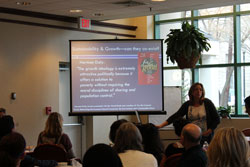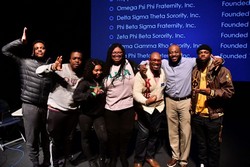Sustainability in this country is becoming more and more of an issue as chemicals, toxins and waste float throughout our ecosphere’s air, water and soil.
Theresa Lam, the Public Policy and Advocacy Committee Chair of the Northeast Organic Farming Association, confronted the sustainability issue as the guest speaker during the Monmouth Area Vegetarian Society’s vegan potluck on Sunday, March 30.
Sustainability is providing resources for our needs today while preserving our environment for future generations, Lam explained. The issue in America is that society is not preserving the environment for future generations, therefore the safety and beauty of the environment is diminishing.
Pew Research found that the global population is expected to increase 38 percent by 2050 and reach a total of 9.6 billion people, opposed to the current population of 6.9 billion. A question many people ask is whether the population size is attributable to the environment’s harm.
Lam mentioned Ian Angus and Simone Butler’s book, “Too Many People,” was created to provide the tools necessary to dismantle the myth of overpopulation. “There are people out there that believe that population is not the problem,” Lam said.
The three main topics Lam focused on to explain how to become sustainable included waste, energy and food.
Many people are not aware of the waste that they leave in the earth every day. “All plastics ever created still exist today,” Lam said. “Whether they have been recycled or not, they are not biodegradable.” It would take thousands of years for any plastic created to break down, Lam added.
Plastic that is in this earth take many forms including in our clothes, (nylon and acrylic) in our food packages, (plastic bags, containers) in our face wash, (beads in facial scrubs are plastic) and in our coffee K-cups, just to name a few. “If you take all the k-cups sold in 2013 they would wrap around the earth 10.5 times,” said Lam. “So that’s just one little piece of trash that people are using every day.”
The plastic that is not recycled ends up in landfills or in vortexes in the middle of ocean due to currents and winds. “And that’s where they stay,” Lam said. “We’ve heard stories about all of these sea otters eating this and dying and the birds think its food and they eat those plastic pieces and it ends up in their stomachs,” which forces them to die from malnutrition.
The different forms of energy in the country used to create electricity also cause many environmental dangers. Energy production processes such as fracking, mining and oil use immerse chemicals into the environment when there are created, processed and used.
The issue is that we have become so dependent on these forms of energy that it is difficult to abandon them. “Do we still take those flights to California? Do we still drive our cars? Yes we do. We are addicted to oil. We are addicted to this energy,” said Lam.
There are many alternative energy solutions, Lam explained. Solar power, wind power and geothermal power are just a few.
The production of food today is also creating hundreds of pounds of waste in the environment. “They centralized the food and farming system,” Lam said. “They’ve decided it’s cheaper and easier to make farms big and produce on a massive monoculture scale.”
They believe it is easier to control food that way, although they are using pesticides, herbicides and genetically modifying our food while also increasing the use of fossil fuels to create food this way, Lam explained. “It is not sustainable,” she said.
“Genetically modified foods are transgenic, they are genes taken from one organism and placed into another organism to create a certain type of benefit …,” said Lam.
Some of the chemicals used in genetic modification are Roundup Ready seeds, which is an herbicide that has the chemical glyphosate in it. “Almost anything green it will kill it,” said Lam. Therefore imagine how it is impacting the body when eaten.
“Roundup is a systemic herbicide which means it can penetrate every single cell in that plant.” Therefore, washing off this herbicide is impossible because it is in every cell, Lam explained.
Another chemical used in food, more often used in corn, is Bt Toxin. “It is produced from bacteria,” said Lam. “It kills the larva stage of the root worm of the worms that eat the corn.” The toxin is in every cell of the corn and chemical companies claim that the toxin is safe.
Most of the corn that you buy in the supermarket if it’s not organic it has the Bt Toxin in it or the Roundup Ready toxin, Lam said. Therefore the only way to avoid these toxins is to eat organically.
There are many ways that people can become more sustainable Lam explained. A few tips she mentioned include growing your own organic garden, bringing families and children to local gardens or farms, buying from local farms and also buying food that are in season.
Supermarkets today offer tropical fruits and vegetables all year round because they are transported hundreds of miles to be sold in your grocery store. “The average food travels 15,000 miles,” Lam explained. Therefore, she refrains from buying bananas, oranges and pineapples in the winter. Instead she eats winter vegetables from her garden.
There are also ways to preserve your food and use winter foods in the summer and summer foods in the winter, Lam said. Fruits and vegetables can be frozen and fermented.
Food and items can also be reused through composting, which can be used to create a natural soil for fruits and vegetables. Items that are biodegradable and can be used in compost include food remains, cotton clothing, coffee grinds, leaves and many other resources.
A few other sustainable solutions Lam mentioned to use less plastic were using alternatives to Ziploc plastic bags, storing food in preservation jars or glass containers and using products that are created out of a sustainable object such as a bicycle or silverware made out of bamboo.
“It really makes you think more in depth about a lot things especially our near future,” Kyle McKenna, a junior communication major said after attending the potluck.
There are many ways that people can get involved locally in becoming more sustainable also. Lam suggests residents get involved in their town’s environmental commission and urge law makers to enforce more sustainable laws in their towns and state. Residents can log onto nj.leg.state.nj.us to learn about the current bills up for discussion in New Jersey regarding environmental issues.
“The people have to do something,” Lam explained, “We can’t just wait around … Don’t be afraid to speak your mind.”
PHOTO TAKEN by Angela Ciroala




